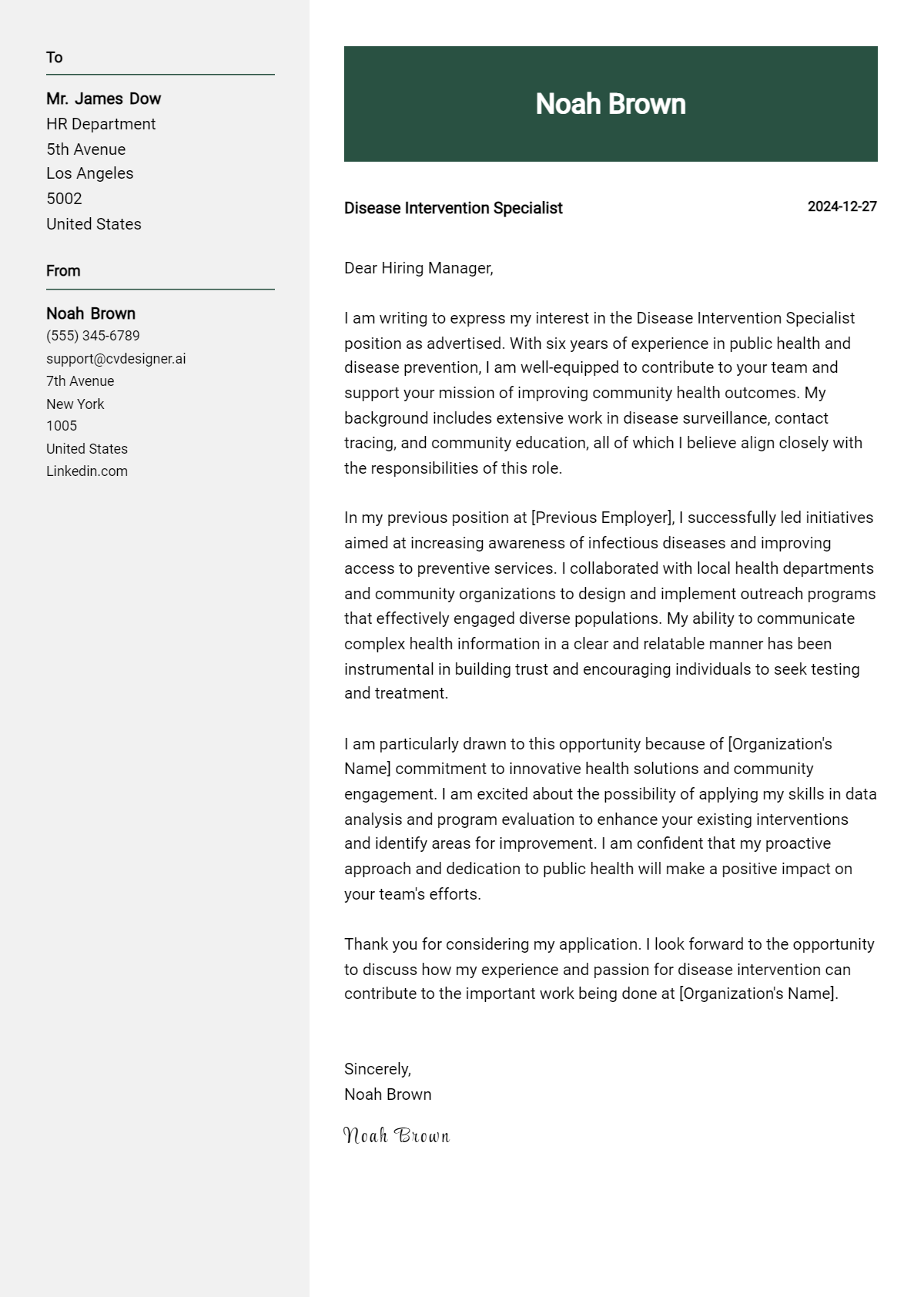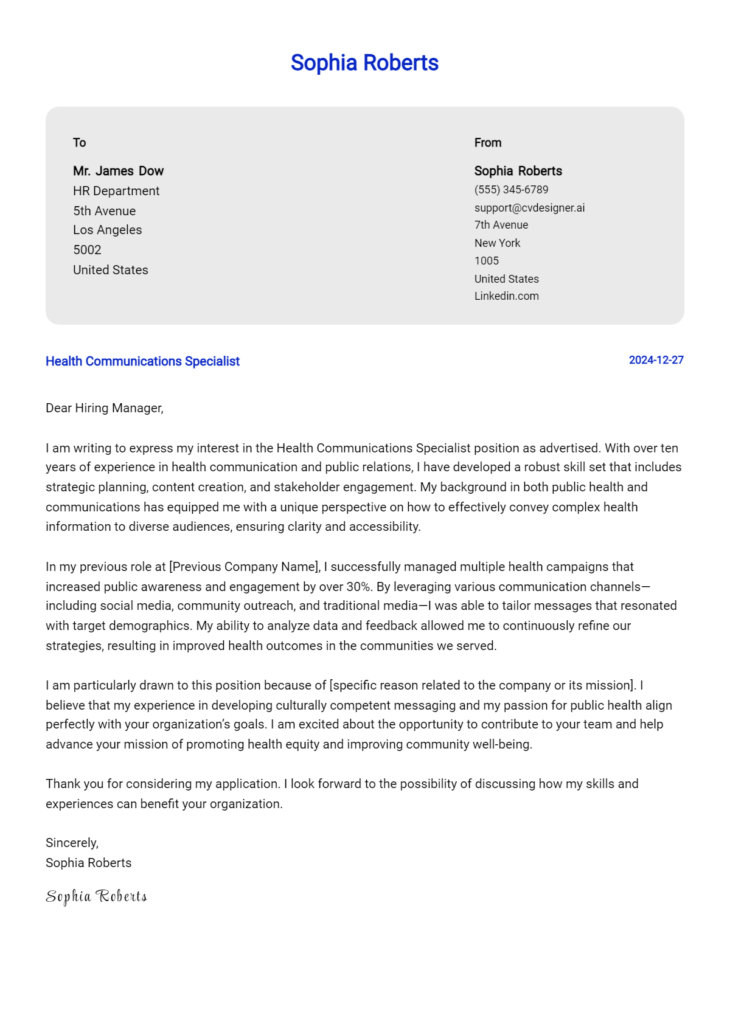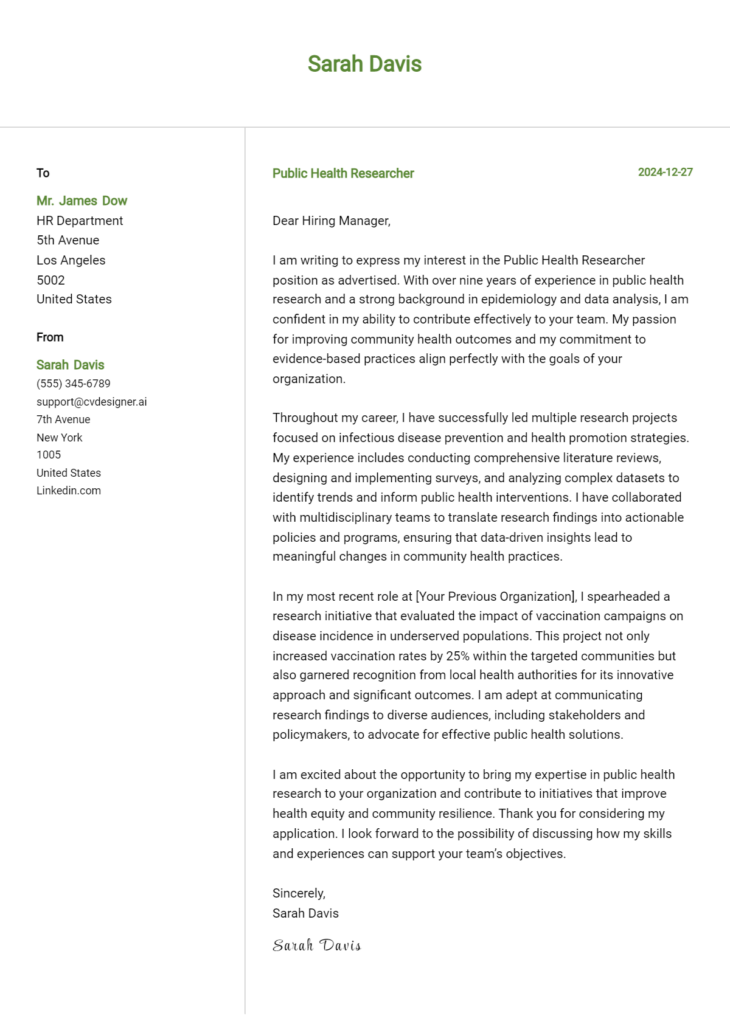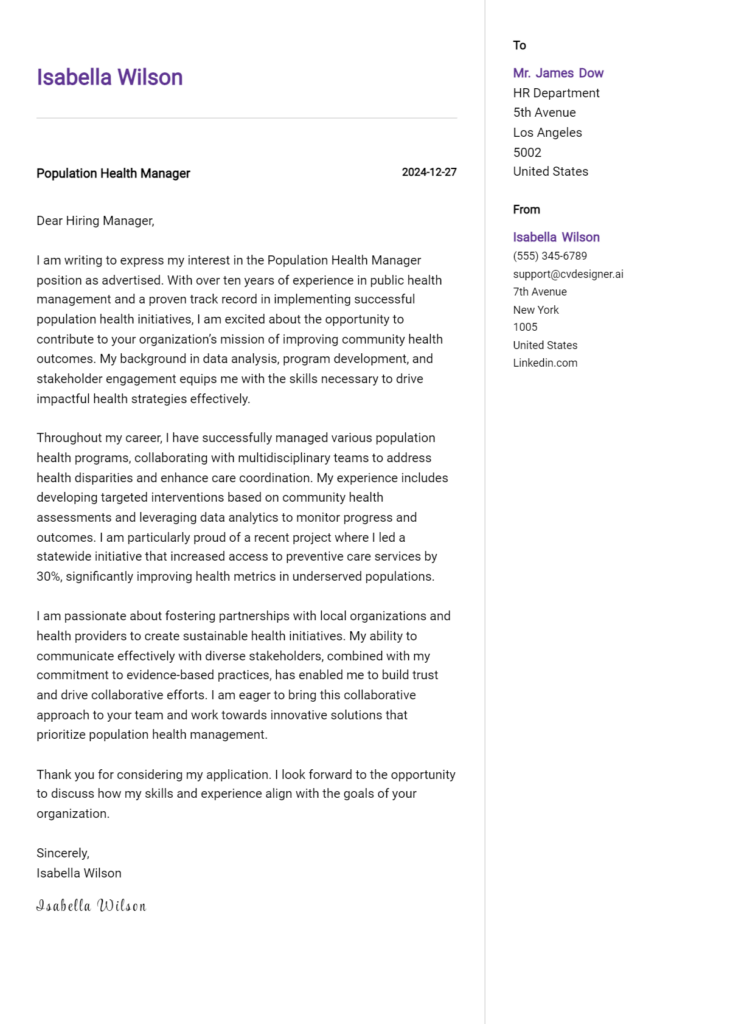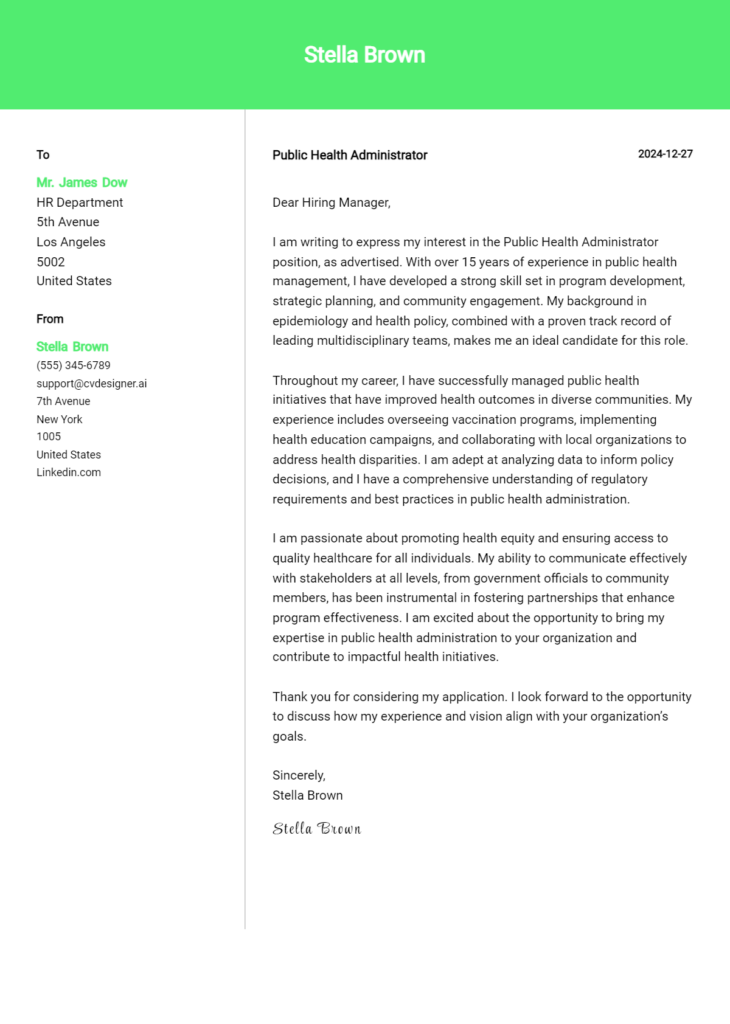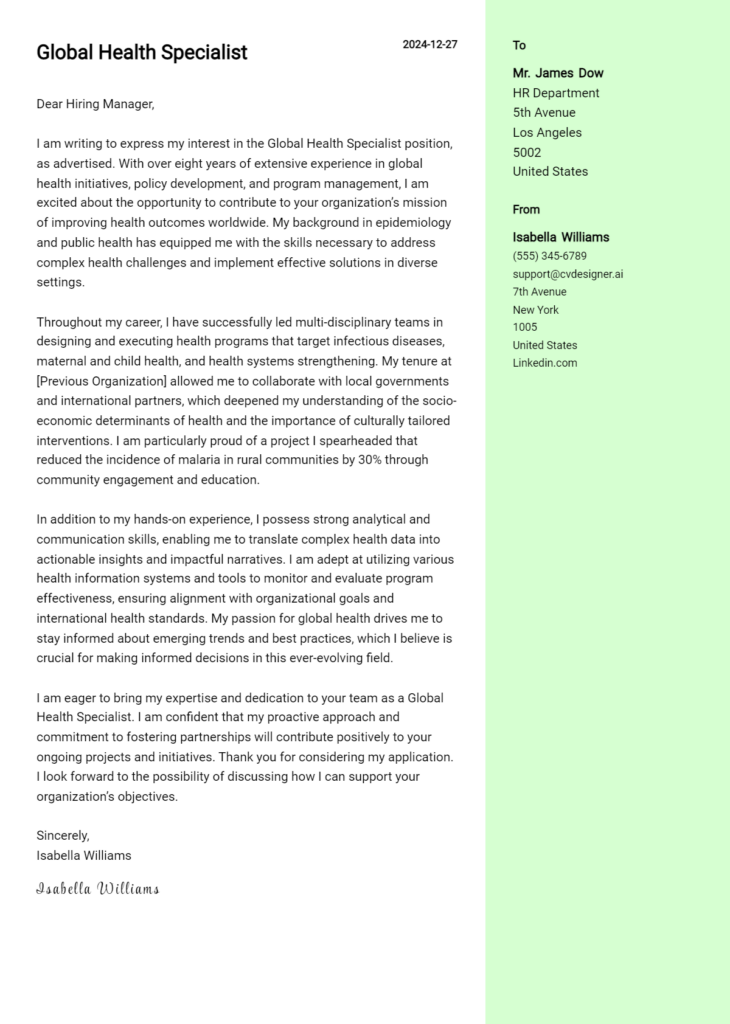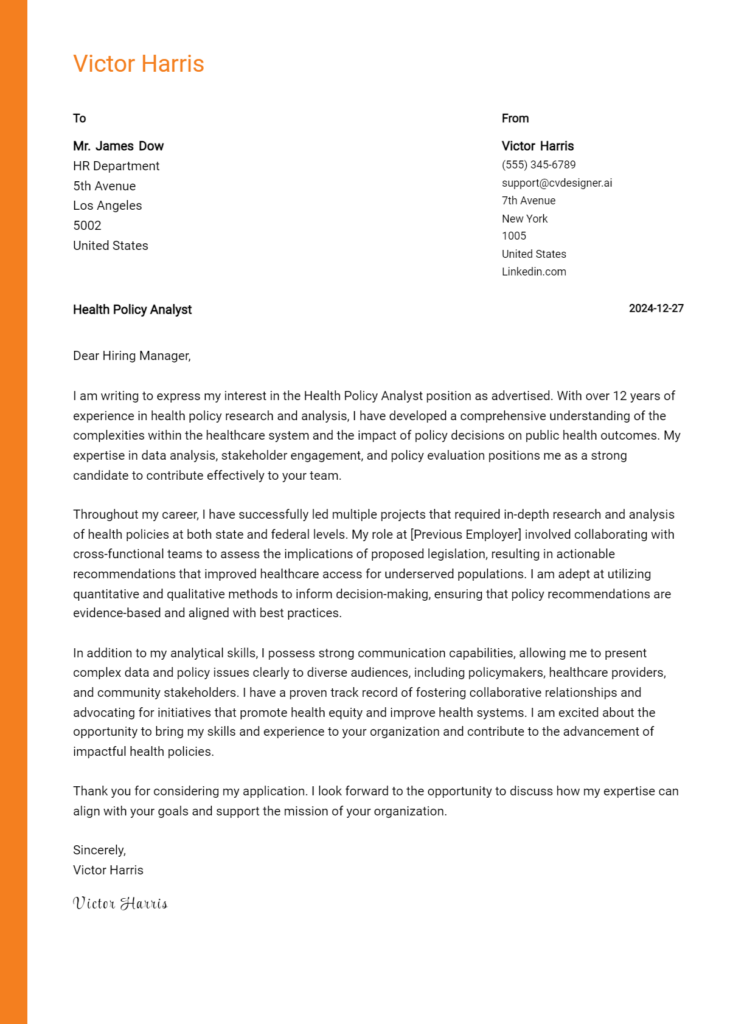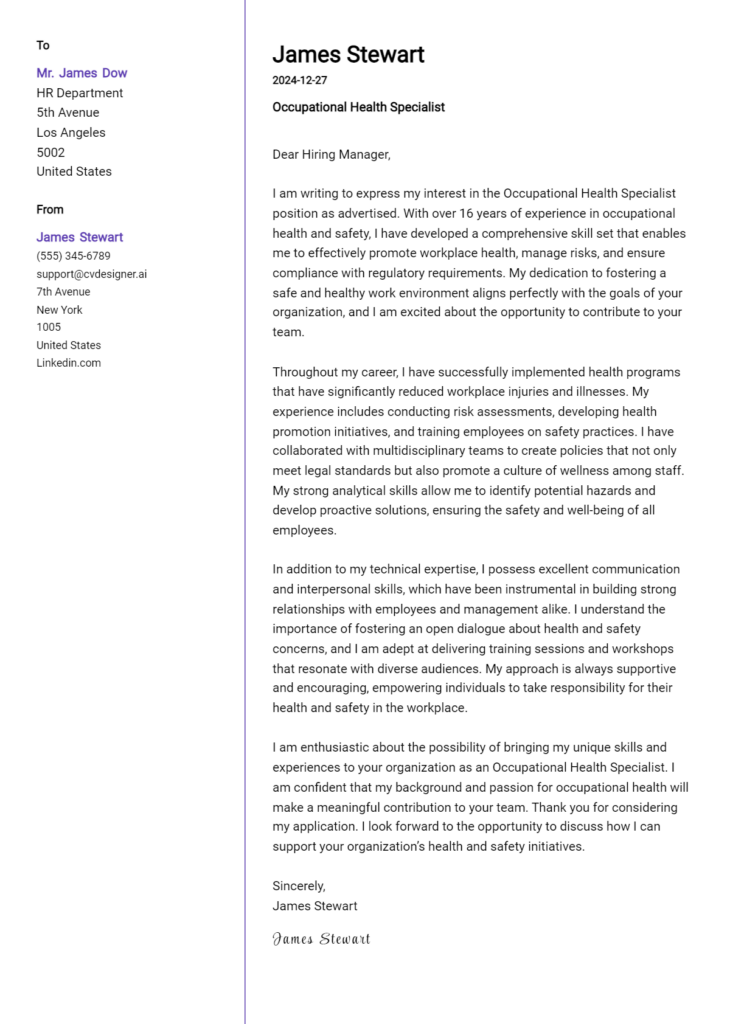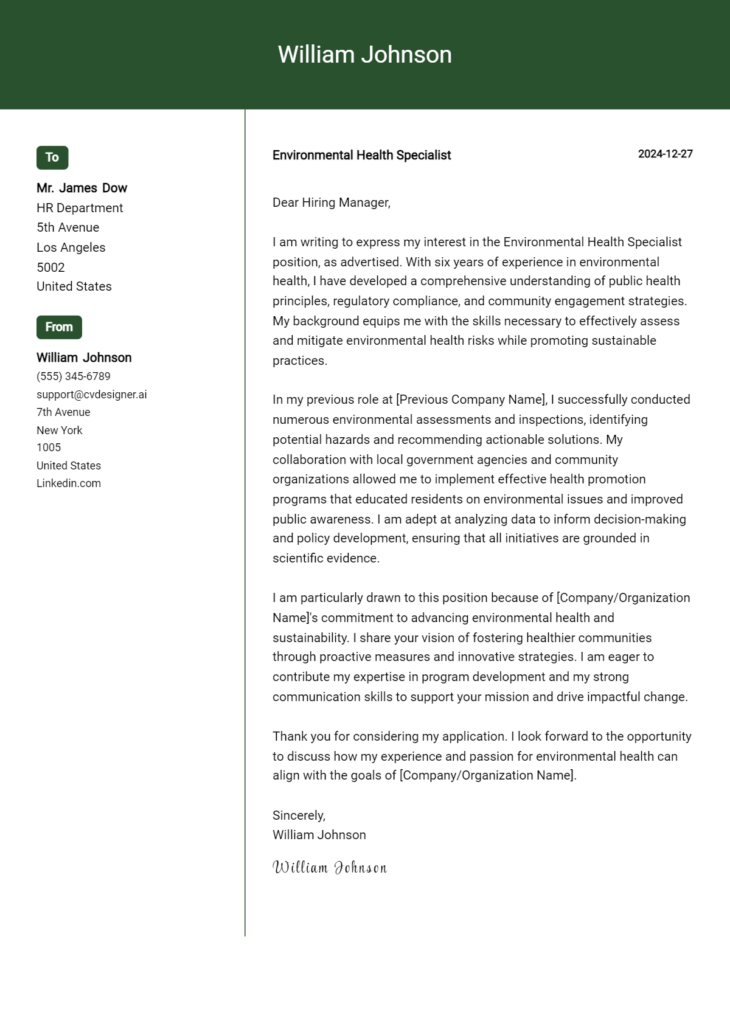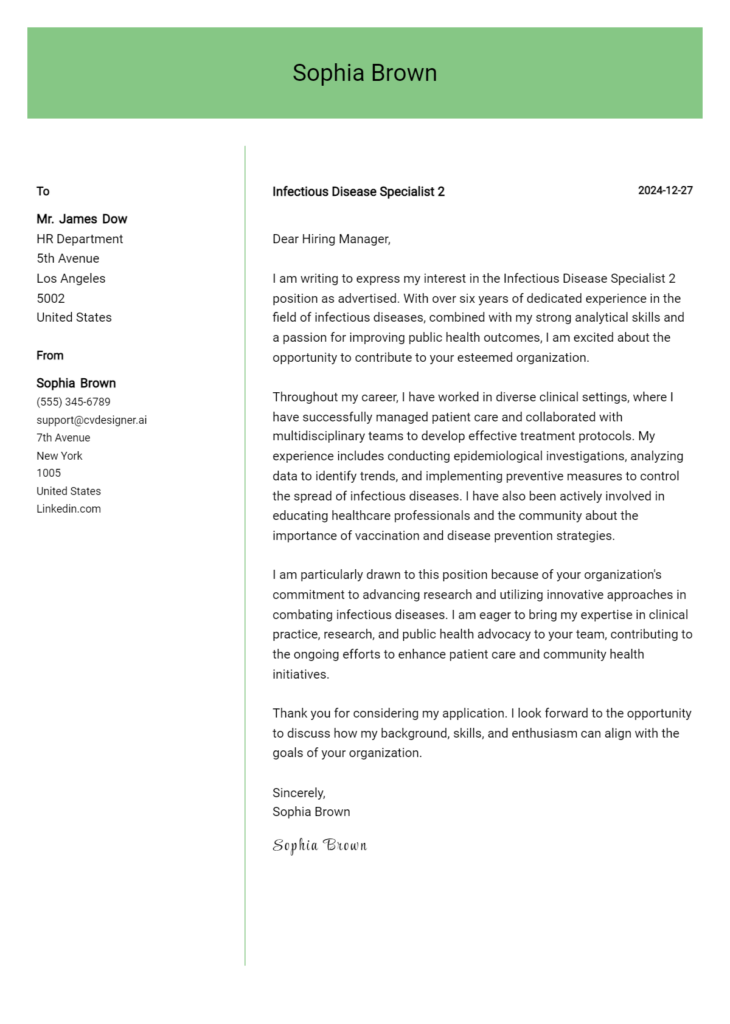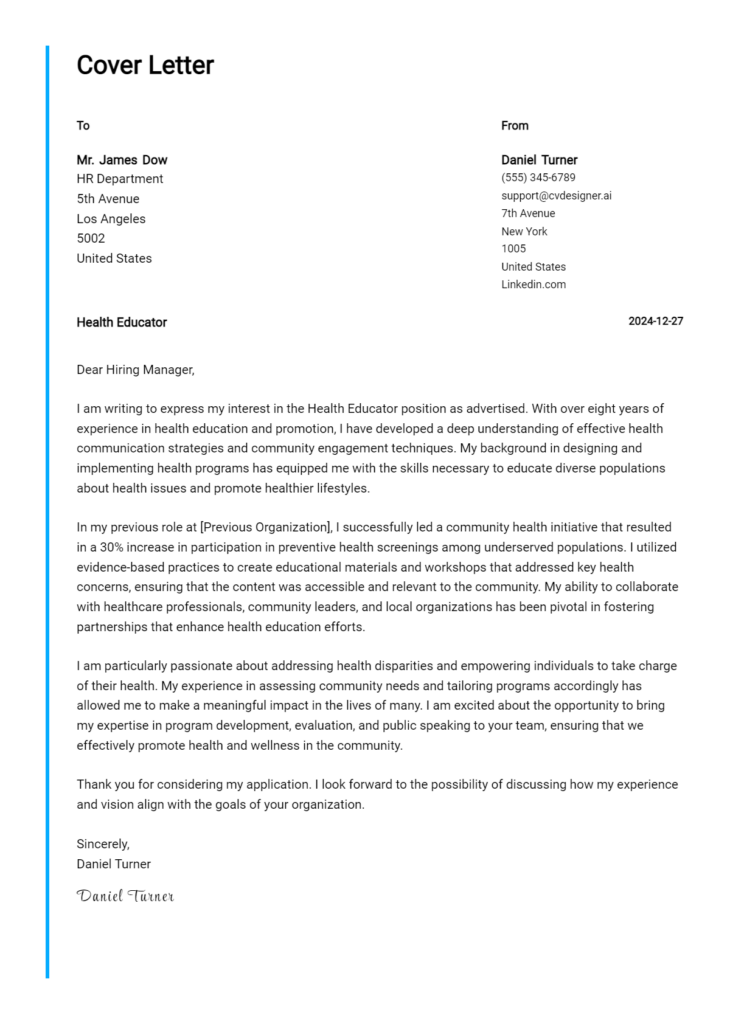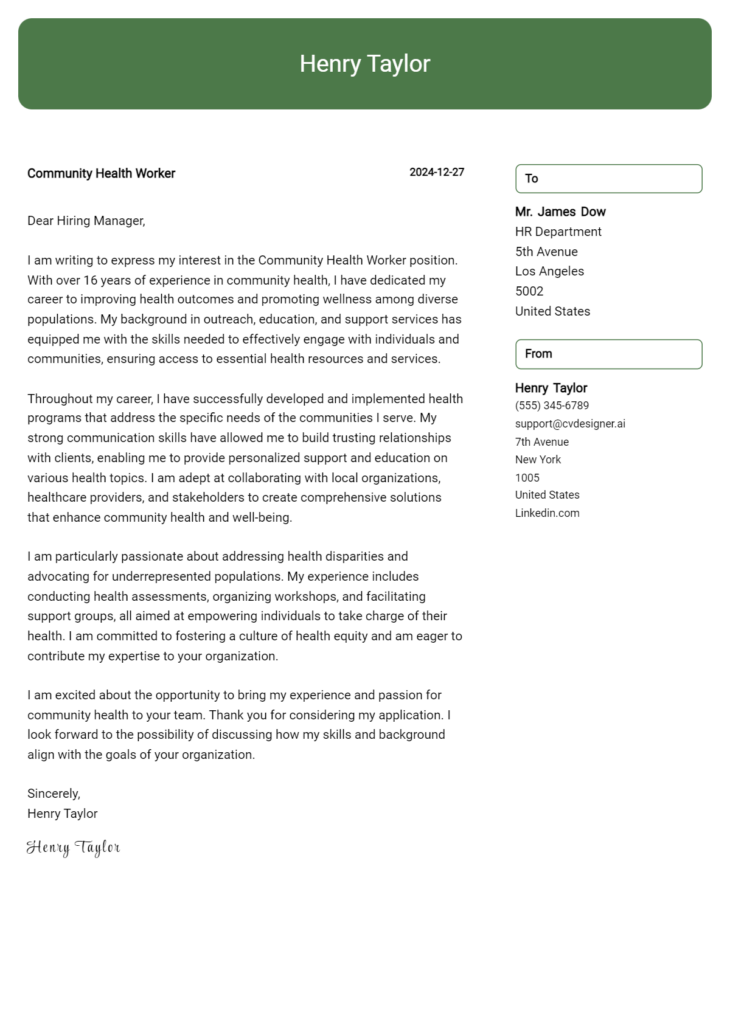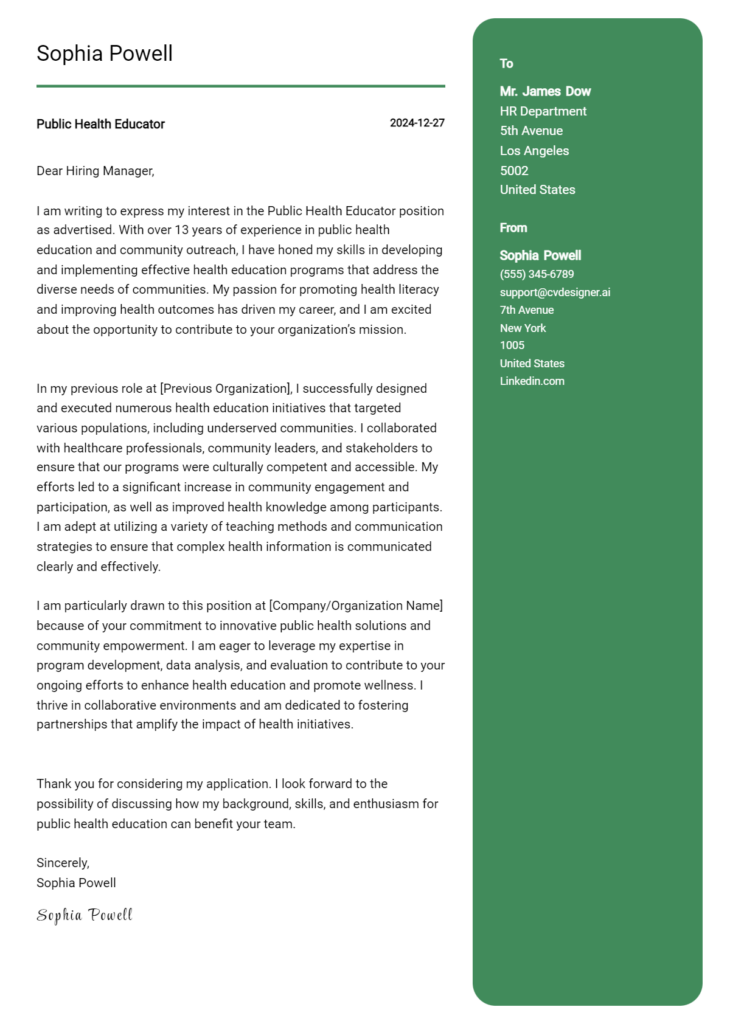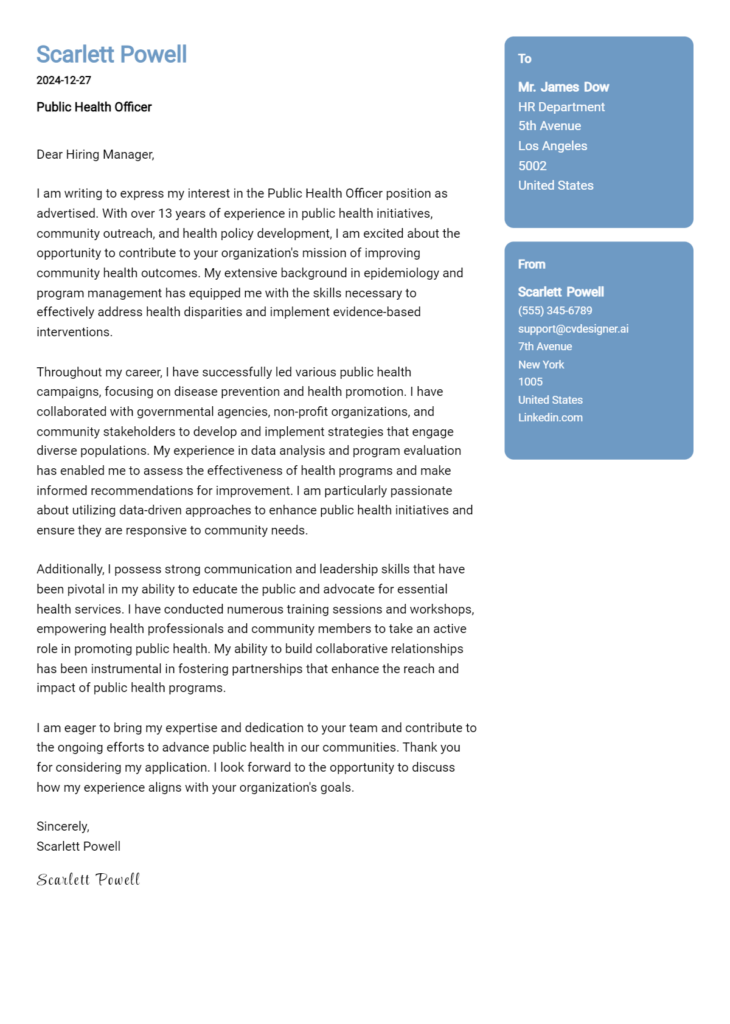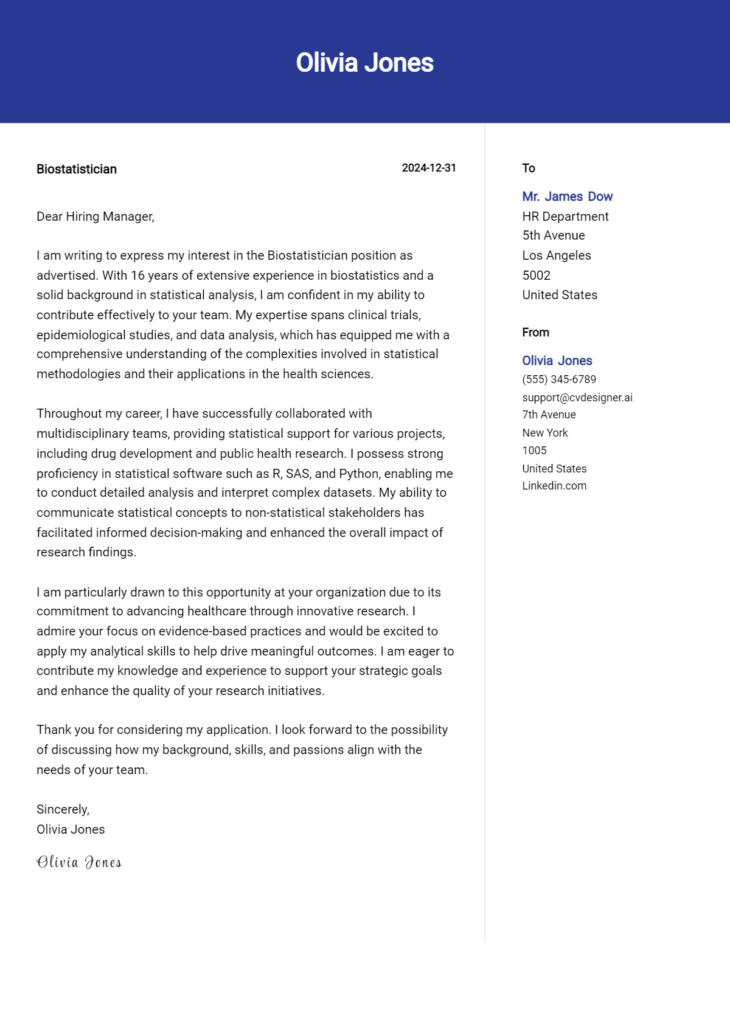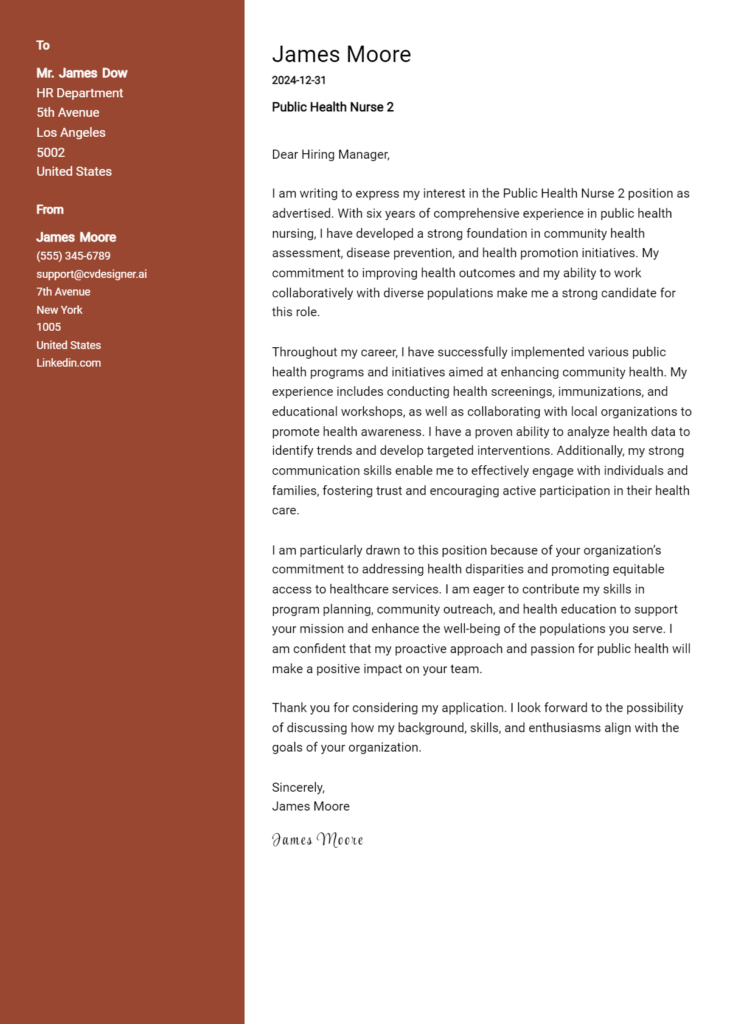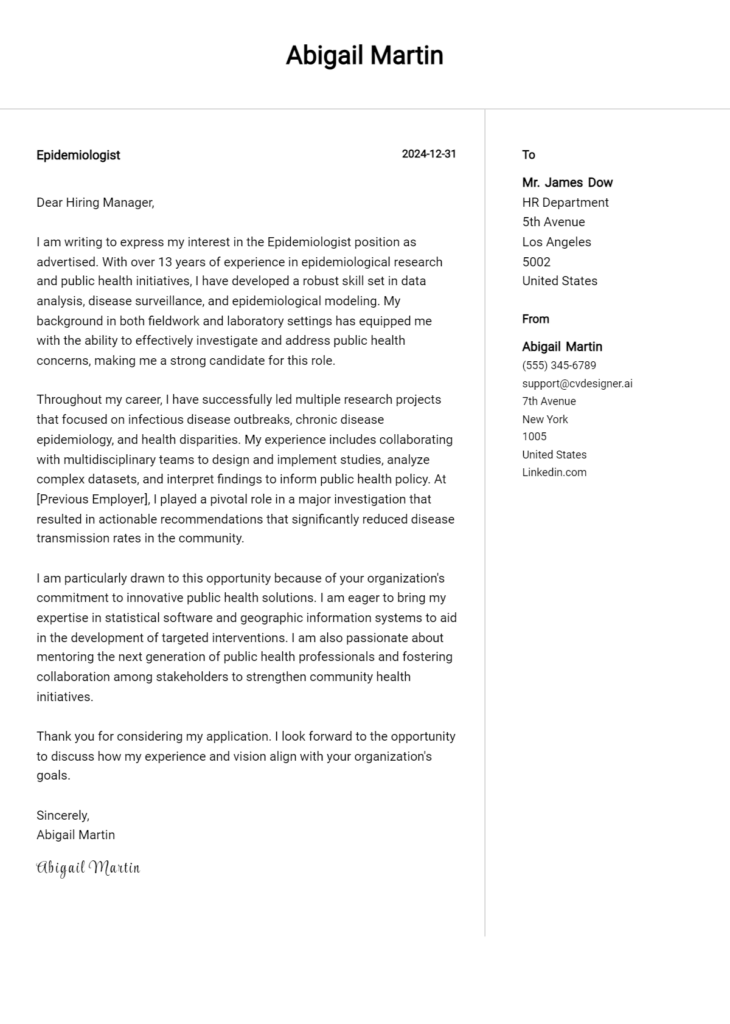Disease Intervention Specialist Cover Letter Examples
Explore additional Disease Intervention Specialist cover letter samples and guides and see what works for your level of experience or role.
How to Format a Disease Intervention Specialist Cover Letter?
Crafting a compelling cover letter for a Disease Intervention Specialist position is essential, as it serves as your first introduction to potential employers. This document not only showcases your qualifications but also demonstrates your commitment to public health and your ability to communicate effectively—critical skills in this field. Proper formatting helps ensure that your cover letter stands out, making it easier for hiring managers to assess your suitability for the role. The structure you choose reflects your professionalism and attention to detail, qualities that are vital in disease intervention work.
In this guide, we will outline how to structure your cover letter, offering insights specifically tailored to the Disease Intervention Specialist role.
We will focus on the essential components of a professional cover letter, including:
- Cover Letter Header
- Cover Letter Greeting
- Cover Letter Introduction
- Cover Letter Body
- Cover Letter Closing
Each section plays a crucial role in emphasizing your qualifications and conveying your passion for disease intervention. Let’s break down each part to help you create a standout cover letter.
Importance of the Cover Letter Header for a Disease Intervention Specialist
The cover letter header is a crucial component of your application as a Disease Intervention Specialist. It serves as the first impression and sets the tone for the rest of your correspondence. A well-organized header not only provides essential contact information but also conveys professionalism and attention to detail, which are vital in the healthcare field. A clear header should include your name, address, phone number, email, the date, and the recipient's details (name, title, organization, address). This information allows the recipient to easily identify who you are and how to contact you, ensuring that your application is taken seriously.
Strong Example
Jane Doe 123 Health St. Wellness City, ST 12345 (123) 456-7890 jane.doe@email.com October 10, 2023 Mr. John Smith Director of Public Health Health Department 456 Care Blvd. Wellness City, ST 12345
Weak Example
jane doe Wellness City jane.doe@email.com 10/10/2023 John Smith
The Importance of a Strong Cover Letter Greeting
The greeting of your cover letter serves as the first impression you make on a potential employer, setting the tone for the rest of your correspondence. A well-crafted greeting reflects professionalism and demonstrates your genuine interest in the position by addressing the hiring manager directly. Personalization in your greeting can make a significant difference; it shows that you have done your homework and are serious about the opportunity. To avoid generic greetings like "To Whom It May Concern," take the time to research the recipient's name, which can often be found on the company website or through professional networking sites. This small effort can convey your enthusiasm and attention to detail.
Strong Greeting Example
Dear Dr. Smith,
Weak Greeting Example
To Whom It May Concern,
Importance of a Well-Crafted Cover Letter Introduction for a Disease Intervention Specialist
A well-crafted cover letter introduction is crucial for a Disease Intervention Specialist as it serves as the first impression to the hiring manager. This opening paragraph should not only capture attention but also convey the candidate’s genuine interest in the role. It is an opportunity to highlight key skills or notable achievements that align with the job requirements, demonstrating why the candidate is an ideal fit for the position. A strong introduction can set the tone for the rest of the letter, increasing the chances of landing an interview. Below are examples of both a strong and a weak cover letter introduction for this role.
Strong Example
Dear [Hiring Manager's Name], I am excited to apply for the Disease Intervention Specialist position at [Company Name], as my extensive background in public health and my passion for disease prevention uniquely position me to contribute to your team. With over five years of experience conducting disease investigations and implementing community outreach programs, I have successfully reduced infection rates by 30% in my previous role. I am eager to leverage my skills in data analysis and patient education to support [Company Name]'s mission of enhancing public health and ensuring community well-being.
Weak Example
To Whom It May Concern, I am applying for the Disease Intervention Specialist job. I think I would be good at it because I have worked in health care before. I have done some outreach stuff and know how to talk to people. I hope to get a call back soon.
Purpose of the Cover Letter Body for a Disease Intervention Specialist
The cover letter body for a Disease Intervention Specialist serves as a crucial platform for candidates to articulate their relevant skills and experiences, demonstrating their value to potential employers. This section should not only highlight educational background and certifications but also showcase specific projects or accomplishments that illustrate the candidate's ability to effectively intervene in disease prevention and control. By providing concrete examples of past work, such as successful outreach initiatives or collaborations with public health agencies, candidates can effectively convey their expertise and commitment to public health. A well-structured cover letter body can differentiate a candidate from others, showcasing their unique contributions and readiness to tackle the challenges of the position.
Strong Example
As a Disease Intervention Specialist at XYZ Health Department, I successfully led a community outreach program that reduced the incidence of sexually transmitted infections by 25% over two years. This initiative involved collaborating with local organizations to provide education and testing services, resulting in over 1,000 individuals receiving preventive care. Additionally, I implemented a data-driven approach to track infection rates and identify at-risk populations, further enhancing our targeted interventions. My ability to analyze complex data and translate it into actionable strategies demonstrates my commitment to advancing public health initiatives and my readiness to contribute effectively to your team.
Weak Example
I have experience working in public health. I have done some projects related to disease prevention. I believe I am a good candidate for this position. I can help your organization with its goals.
Importance of the Cover Letter Closing for a Disease Intervention Specialist
The closing paragraph of a cover letter is crucial for leaving a lasting impression on the hiring manager. It serves to summarize the qualifications that make the applicant a suitable candidate for the Disease Intervention Specialist role, reiterates enthusiasm for the opportunity, and encourages the next steps, such as reviewing the resume or scheduling an interview. A strong closing reinforces the candidate's commitment to the position and their readiness to contribute to public health efforts, while a weak closing may fail to convey enthusiasm and leave the reader wanting more clarity.
Strong Example
Thank you for considering my application for the Disease Intervention Specialist position. With a solid background in public health and a passion for disease prevention, I am eager to bring my skills in community engagement and data analysis to your team. I am excited about the opportunity to contribute to your mission and would welcome the chance to further discuss how my experience aligns with your needs. I look forward to the possibility of an interview to explore this exciting opportunity together.
Weak Example
I hope you like my application for the Disease Intervention Specialist job. I have some experience and would like to work with you. Please let me know if you want to talk more. Thanks for your time.
Crafting a compelling cover letter for a Disease Intervention Specialist position is crucial to stand out in a competitive field. This document should not only highlight your technical skills and problem-solving abilities but also demonstrate your knowledge of the Software Development Life Cycle (SDLC) and your capacity for teamwork. Additionally, expressing a passion for continuous learning can significantly enhance your application. Here are some tips to help you create an effective cover letter that showcases these essential qualities.
Cover Letter Writing Tips for Disease Intervention Specialist
Highlight Relevant Technical Skills: Clearly outline the technical skills that are pertinent to the role. This may include proficiency in data analysis tools, understanding of epidemiological models, or experience with health informatics systems. Use specific examples from your past work to illustrate how these skills have contributed to successful disease intervention initiatives.
Demonstrate Problem-Solving Abilities: Disease intervention often requires innovative solutions to complex challenges. Share specific instances where you identified a problem and implemented a successful strategy. Use metrics or outcomes to quantify your success, showing potential employers that you can think critically and act decisively.
Showcase Knowledge of SDLC: If your role involves working with public health technology or data systems, mention your familiarity with the Software Development Life Cycle. Discuss how your experience with system design, implementation, and evaluation has equipped you to contribute to projects that improve disease intervention processes.
Emphasize Teamwork and Collaboration: Disease intervention is rarely a solo endeavor. Highlight your experience working in multidisciplinary teams, emphasizing your ability to collaborate effectively with healthcare professionals, community organizations, and government agencies. Provide examples of successful projects where teamwork played a crucial role in achieving public health objectives.
Express a Passion for Continuous Learning: The field of public health is ever-evolving. Convey your commitment to ongoing education and professional development. Mention any relevant certifications, workshops, or training programs you have pursued to stay updated on the latest trends and best practices in disease intervention.
By incorporating these elements into your cover letter, you can create a compelling narrative that showcases your qualifications for the Disease Intervention Specialist role. For additional assistance, consider utilizing cover letter templates or a cover letter builder to structure your application effectively.
Common Mistakes to Avoid in a Disease Intervention Specialist Cover Letter
Crafting an effective cover letter is essential for landing a position as a Disease Intervention Specialist. Avoiding common mistakes can significantly enhance your chances of making a strong impression on hiring managers. Here are several pitfalls to watch out for:
Generic Content: Using a one-size-fits-all approach can be detrimental. Tailor your cover letter to the specific role and organization. Mention the agency's mission and how your skills align with their goals.
Lack of Specific Examples: Failing to provide concrete examples of your experience can weaken your application. Highlight specific instances where you successfully intervened in disease outbreaks or promoted public health initiatives.
Ignoring the Job Description: Not addressing the key qualifications listed in the job posting can leave your letter lacking. Use the job description as a guide to emphasize relevant skills and experiences.
Poor Formatting: A cluttered or unprofessional appearance can detract from your message. Adhere to proper cover letter format to ensure clarity and readability.
Spelling and Grammar Errors: Typos can create a negative impression. Always proofread your letter or use tools to catch mistakes before submission.
Overly Technical Language: While your role requires specialized knowledge, using jargon can alienate the reader. Keep your language clear and accessible.
Neglecting a Strong Closing: Failing to end on a compelling note can leave your application flat. Reiterate your enthusiasm for the role and include a call to action, expressing your desire for an interview.
By steering clear of these common mistakes and utilizing resources like cover letter examples, you can create a compelling cover letter that effectively showcases your qualifications for a Disease Intervention Specialist position.
Cover Letter FAQs for Disease Intervention Specialist
What should I include in my cover letter for a Disease Intervention Specialist position?
In your cover letter, you should highlight your relevant experience, skills, and passion for public health. Start with an engaging introduction that mentions the position and how you learned about it. Detail your experience in disease intervention, contact tracing, or public health education, emphasizing any specific training or certifications. Discuss your ability to work with diverse populations and your skills in communication, empathy, and problem-solving. Finally, express your enthusiasm for the role and how it aligns with your career goals, making sure to connect your personal mission with the organization's objectives.
How can I demonstrate my passion for public health in my cover letter?
To demonstrate your passion for public health, share personal anecdotes or experiences that led you to pursue a career as a Disease Intervention Specialist. Discuss any volunteer work, internships, or projects where you made a positive impact in your community. Highlight your commitment to improving public health outcomes, whether through education, outreach, or direct intervention. Additionally, mention any ongoing education, workshops, or conferences you’ve attended that showcase your dedication to staying informed about current public health issues. This personal touch can resonate with hiring managers and convey your genuine interest in the field.
Should I tailor my cover letter for each application?
Yes, tailoring your cover letter for each application is crucial. A customized cover letter allows you to align your skills and experiences with the specific requirements of the job description. Research the organization’s mission, values, and specific programs they run, and reflect that understanding in your letter. Mention the particular challenges the organization faces and how your background equips you to address those challenges. This personalized approach not only demonstrates your interest in the role but also shows that you've invested time in understanding the organization, making you a more compelling candidate.
How long should my cover letter be?
Your cover letter should ideally be one page long, consisting of three to four paragraphs. Aim for a length of about 250 to 400 words. This length allows you to provide enough detail about your qualifications and experiences without overwhelming the reader. Keep your language concise and focused, using bullet points if necessary to highlight key achievements or skills. Remember that the purpose is to entice the hiring manager to read your resume, so ensure every sentence adds value and reinforces your suitability for the Disease Intervention Specialist role.
Build your Cover Letter in minutes
Use an AI-powered cover letter builder and have your letter done in 5 minutes. Just select your template and our software will guide you through the process.

